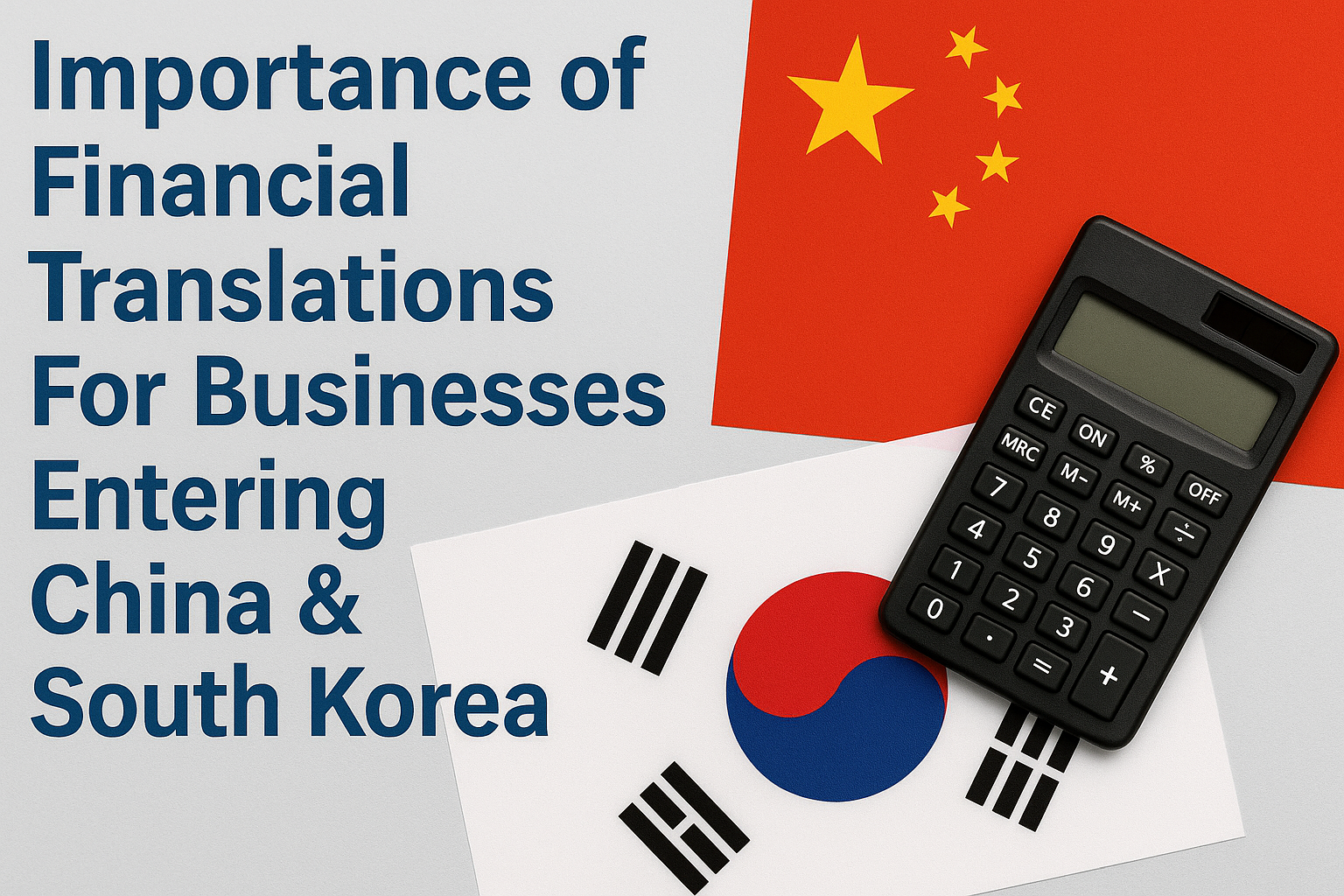Entering China and South Korea means more than selling products. It means understanding how business works in each place. Rules, reports, and records must match local laws. If not, deals may fall apart.
This is where financial translation becomes key. A Chinese translation agency helps turn balance sheets, contracts, and audits into words that Chinese partners can trust. It’s not just about changing language. It’s about getting every number, term, and meaning right.
Without clear financial documents, trust breaks. With strong translations, companies grow faster and avoid costly mistakes.
Why Financial Accuracy Is Non-Negotiable
Money talk is exact. There is no room for guessing. A small error can change the meaning of a full report.
When companies show their books to Chinese or Korean banks or investors, they must be correct. This means the figures, labels, and even the order of items must follow local formats.
In China, numbers and accounting terms follow strict rules set by national bodies. South Korea also follows global and local standards, including K-IFRS. Mixing these up can make your report invalid.
Proper translations help keep the report true to the original, but in a way that local experts can read and accept.
Financial Terminology Differs by Country
Some financial words do not mean the same in all countries. For example, the term “equity” may be used differently in China than in the West. In Korea, tax words can be tied closely to cultural views about fairness and duty.
If you use the wrong term, it can lead to confusion. Worse, it might look like the company is hiding something.
Only skilled translators with finance backgrounds understand these small but key differences. They help translate the idea, not just the word.
This is why many businesses hire experts who speak the local language and know the financial world well.
Aligning with Local Reporting Systems
Each country has its own way of reporting financials. In China, the structure of reports must match national standards. These include codes for each item and approved tax language.
In South Korea, the layout and tone of financial records often reflect both business formality and national systems. There is a clear pattern for income statements, expense reports, and shareholder data.
When entering these markets, your translated documents must “look and feel” local. Not doing so might make your business seem unready or unprofessional.
Proper translations can shape how banks and government offices view your company.
Legal Compliance in Financial Disclosures
Laws in China and South Korea demand clear and complete financial reporting. If a company fails to meet these rules, it may face fines or delays.
In China, even a missing stamp or wrong format can stop a deal. Financial documents for licenses, taxes, and cross-border payments must follow strict laws.
South Korea also watches foreign companies closely. Even if your business is small, it must meet the same laws as local firms.
Financial translation helps your documents pass checks the first time. It reduces the risk of errors that cause problems later.
Building Trust with Local Partners
Trust is everything in new markets. Local investors, banks, and partners want to work with companies that respect their ways of doing business.
When financial documents are well translated, it shows care. It also shows you understand the rules of the market.
Clear income reports, tax filings, and audit letters help answer the most common question: “Is this business safe to work with?”
A poor translation, even if honest, can raise red flags. A clear one helps you start relationships on the right foot.
Translation Supports Investor Confidence
Both Chinese and South Korean investors pay close attention to financial history. They look for clean books and clear growth plans.
If your financial translations are weak, investors may walk away. They may not trust the numbers, or they may worry you don’t understand the local market.
High-quality translations help show your plans in a way that local readers can understand. This includes the language used, the tone, and how details are shared.
With strong financial translations, your pitch becomes clear. And clear pitches build trust.
M&A Transactions Require Precision
Buying or joining a company in China or South Korea means deep financial reviews. These include checking past earnings, assets, and debts.
During this process, every document must be translated with care. If numbers are off or terms are unclear, the deal may fall through.
A mix-up between terms like “current liability” and “long-term debt” can lead to big misunderstandings.
This is where professional Korean translation services make a difference. They ensure every term used during merger talks is clear, legal, and correct.
Smooth Banking and Cross-Border Transactions
International companies often face delays due to unclear documents. Banks may hold payments or block transactions if forms are incomplete.
In China, banking officials need translated documents to release foreign currency or process wires. These documents include financial reports, invoices, and customs records.
In South Korea, banks may request translated loan documents, tax forms, or proof of earnings.
When these are not in the correct format or language, delays happen. Good financial translation helps transactions go through on time and without issues.
Government and Regulatory Filings
Entering China or South Korea often means working with tax offices, customs units, and finance regulators.
Each agency needs different documents. These include income reports, cost breakdowns, and license forms. All of them must be in the local language, often with extra layers of approval.
Errors here cause long delays or even rejections. When you file in the right format and tone, your documents move faster through the system.
Financial translators help match the terms used by government staff, which speeds up approvals.
Local Branding Through Numbers
Numbers also shape your brand. In both China and South Korea, how you show your profit, growth, or investment plan affects how people see your business.
Financial reports are not just records. They are part of your story. Clean reports help people see your company as stable and smart.
Well-translated reports show your message without confusion. They help local readers connect with your goals.
When reports are confusing, it becomes harder to trust the company behind them.
Future Growth and Long-Term Planning
Once inside the market, your business will grow. As it does, you’ll need to share more financial documents, quarterly reports, investor notes, and tax records.
Doing this the right way from day one saves time and builds a strong base. It also helps your business scale without constant backtracking.
A small mistake now can lead to a big cost later. Good financial translation avoids this.
As you grow, the need for accurate records increases. That’s why strong translation is a smart long-term move.
Final Words!
Financial translations are not just about language. They are about trust, law, and clear communication. Businesses that take this seriously are more likely to succeed in China and South Korea. By translating financial documents with care, companies build lasting relationships, avoid legal trouble, and grow with confidence.


 Language3 months ago
Language3 months ago
 Culture3 months ago
Culture3 months ago
 Tech3 months ago
Tech3 months ago
 Culture3 months ago
Culture3 months ago
 Language3 months ago
Language3 months ago
 Tech2 months ago
Tech2 months ago
 Uncategorized3 months ago
Uncategorized3 months ago
 Fashion2 months ago
Fashion2 months ago





